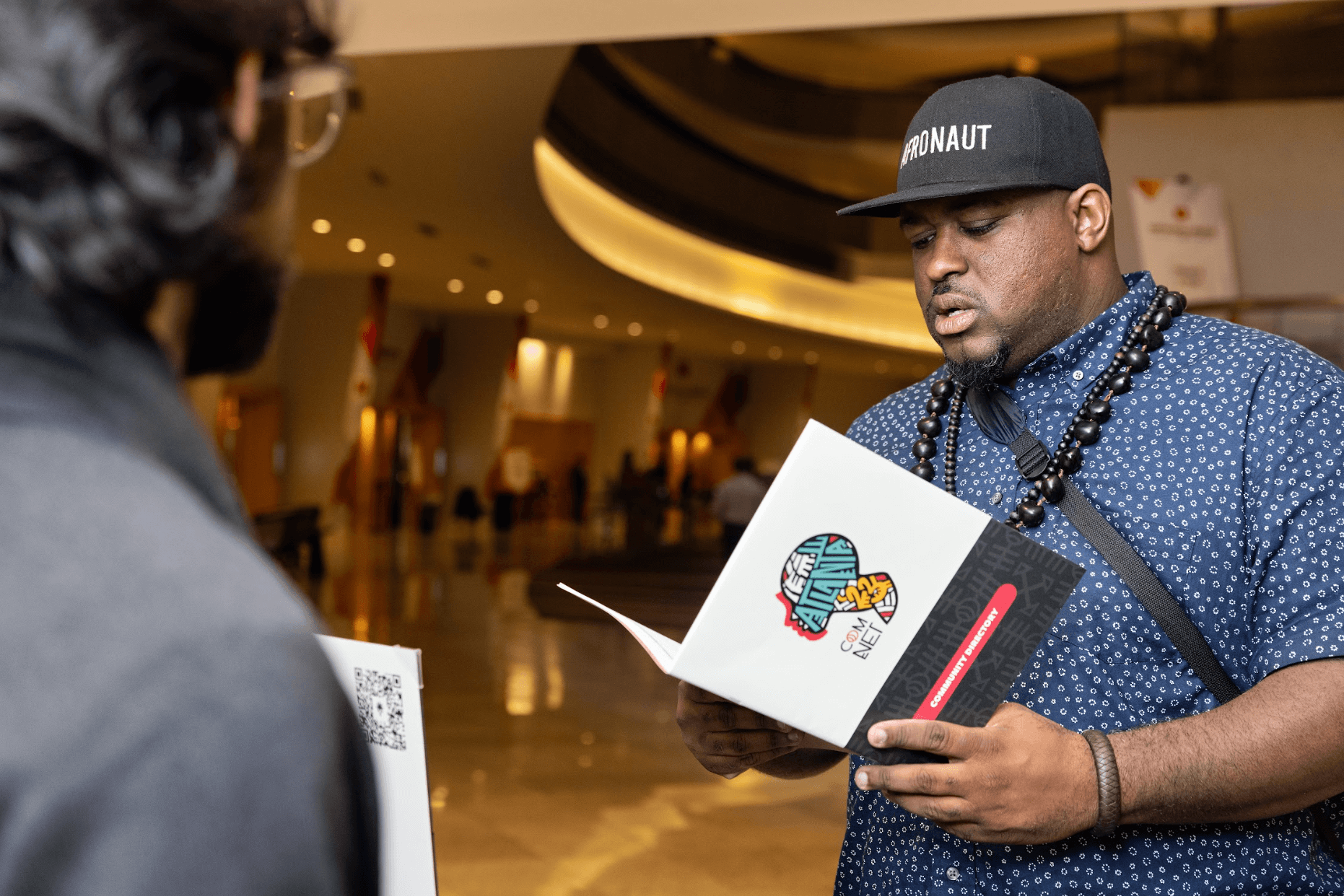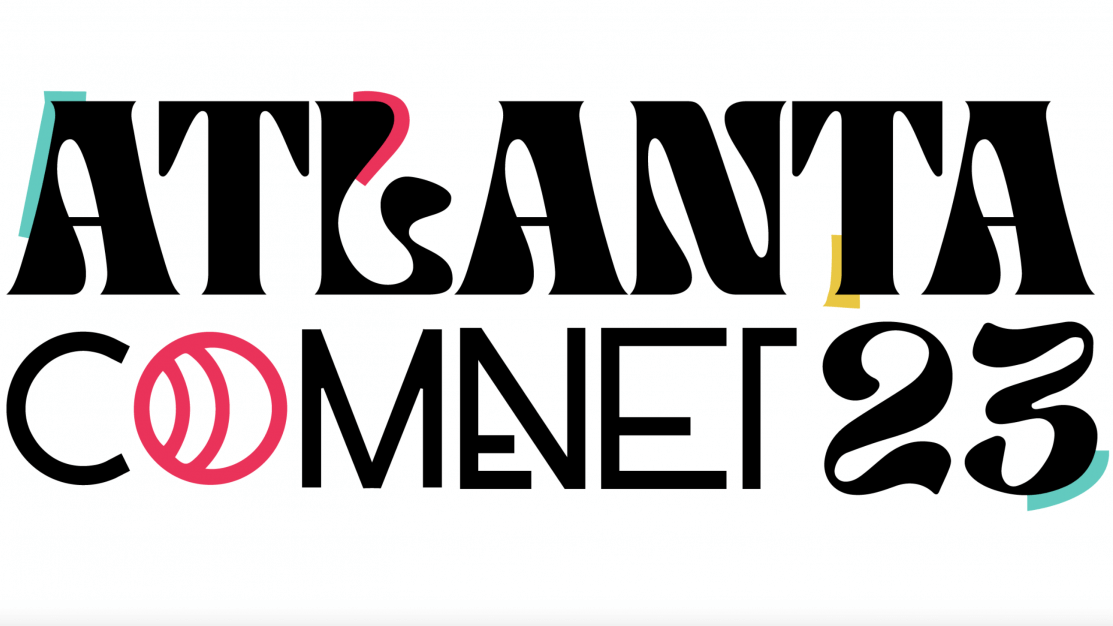The Communications Network Annual Conference (ComNet23) was held in Atlanta, GA this past September, featuring impactful and transformative ideas, insights, inspirations and fun activities for strategic communications professionals. Our Director of Community Engagement, Marcus Cinque Harris (he/him) attended the 3 day event and participated in various learning activities, workshops, and community building events with partners and peers.

LaTosha Brown sings Love & Power
There were tons of amazing speakers and presenters at ComNet23, but I really appreciated LaTosha Brown’s words to “Spread Love & Build Power.”
After opening her speech with a beautiful rendition of Amazing Grace, LaTosha Brown (Black Voters Matter) shared a powerful antidote about her early days as a community organizer and the lesson she learned about prioritizing relationships over tasks. Her message to continue centering people in our work really aligns with our Liberatory Design process and the recent projects we’ve collaborated on with organizations who value community input.
When you are able…
Redefining Capacity Building
What are the words that we use in the nonprofit communications sector that have become jargon?
Near the top of my list – Capacity. We frequently hear this term thrown around but what does it actually mean? And, how do we build capacity without giving organizations the tools and support needed to implement new strategies long term and build sustainable structures?
All of these questions were presented and discussed during (and after), ComNet23’s day 2 learning lab titled, “Advancing Equity & Social Change Through Grantee Communication”. In the session, communications-focused capacity building was examined as a tool for effective change when funders co-create and develop an asset-based approach to building relationships with their grantees & their communities. However, capacity building work focused on training, information sharing, and knowledge building tend to get prioritized in funding programs over actual implementation and tactical support for administrational needs.
The hard truth is that many organizational leaders are the ones who tend to participate in capacity building training and have the knowledge and understanding of what needs to be done to better support their communities and organizations. However, they frequently lack the resources to implement those ideas and tactics into sustainable actions. As one of our recent cohort participants shared, for community-based organizations struggling with capacity can represent a plethora of systematic & organizational issues that don’t get addressed, such as staffing, expertise, time, and management.
If we are truly centering the needs of people in our work, then we have to adjust the strategy of capacity building to include a more holistic approach that integrates continued learning & tactical support to their organizations. At rootid, we are exploring ways to support organizations with a more impactful long term strategy around communications. Our new products & services like BloomBox will provide additional support to community-based organizations & smaller nonprofits struggling with communications capacity by providing them with a strategic partner to act as an add-on communications department.
Artificial Intelligence – Why We Need to Get Informed & Involved
I have always been deeply interested in new advances in technology. As a child, science fiction movies like Back to the Future and The Matrix sparked my curiosity about the possibilities of compmuter science and how our world could change for better or worse. One of my favorite movies as a child was Terminator – a movie about computer programs taking over the world. Needless to say, I understand having a healthy skepticism of Artificial Intelligence. However, technology is a necessary tool for communities to embrace and understand as we move forward.
Aimee Rinehart (Associated Press) and Mikhael Simmonds (Center for Community Media at CUNY) gave us, The Story of AI – a crash course keynote encouraging us to inform ourselves and get involved.
In order to find a solution we have to be able to articulate the problem.
Mikhael Simmonds
Executive Director at the Center for Community Media at CUNY
Their presentation & QA lead to great conversations all week. However, it was the importance of including diverse voices in the development of LLMs (or, Large Language Models) that stuck out to me. A large language model (LLM) is a type of algorithm that uses deep learning techniques to understand, summarize, generate and predict new content. As tools like ChatGPT continue to be explored, it is important that we train the technology in an inclusive and equitable way that provides multiple perspectives and context.
Connecting in Community
Outside of all the great professional development activities & learning labs, the best part of the conference was being able to experience Atlanta while connecting with our partners & peers in-person. As a fully remote organization, it’s rare that we get to share space in a post-pandemic world, but it was truly a pleasure connecting with some of our recent partners like Kathleen Pequeño & Tracy Serdjenian from NorthStar Fund, Arianna Rosales from National Immigration Project, and Minal Bopaiah of Brevity & Wit (who shared this helpful & important tool – Brevity & Wit’s Inclusive Imagery Checklist).
We even got to participate in ComNet23’s ShowCase Poster Presentation for a second year in a row. Our ComNet23 ShowCase Poster theme, “Shifting Culture & Strengthening Communication Starts With You!” focused on a practical way to dismantle power structures and embody the values of equity and inclusion within your internal communications and culture. (see the video presentation below)
Overall, the event was extremely inspiring and impactful for our organization. I was proud to represent rootid and build with so many amazing people over the course of my 3 days in Atlanta. We are definitely excited about ComNet 24 in Kansas City. In the words of the Terminator, “I’ll be back!”

